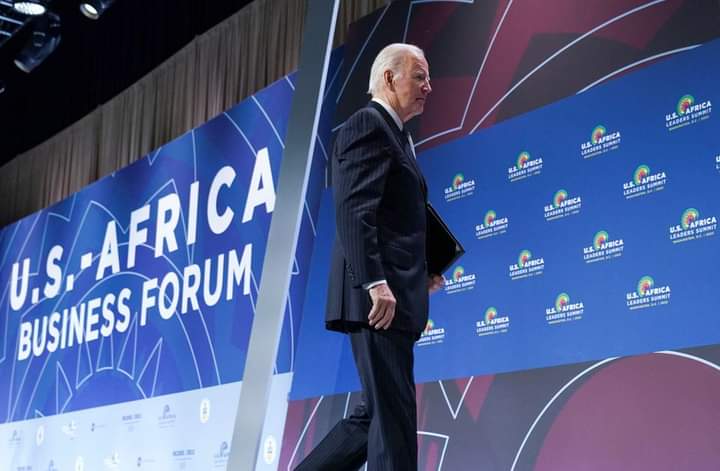Biden says US is “all in” for Africa future

Years after which the continent was neglected in favour of other U.S. priorities as China made inroads with investments and commerce, President Joe Biden unveiled an agreement on Wednesday aimed at strengthening trade connections between the United States and Africa.
During a three-day summit in Washington, Biden informed African leaders present that “The United States is ‘all in’ on Africa’s future.”
In contrast to China, which has pushed to enlarge its influence by sponsoring infrastructure projects worldwide, Biden’s speech and the summit seek to position the United States as a partner to African nations. China trades with Africa at a rate that is around four times that of the United States, and Beijing has established itself as a significant creditor by providing loans with lenient terms compared to Western lenders.
According to Biden, the African Continental Free Trade Area will provide American businesses with access to 1.3 billion people and a $3.4 trillion market. He named businesses that had transacted business at the summit, including Cisco Systems Inc. and General Electric Co. (CSCO.O).
“The United States benefits when Africa succeeds. Quite frankly, success extends to everyone in the world “declared the president.
The three-day summit, the first of its type since 2014, is being attended by delegations from 49 nations and the African Union, 45 African national leaders included. Under the Biden administration, Washington has provided $55 billion in assistance to Africa for issues such as food security, climate change, trade agreements, and other matters.
Following his speech, Biden watched a portion of the Morocco vs. France World Cup semifinal with Aziz Akhannouch, the prime minister of Morocco, and other summit participants, according to the White House.
As part of a conversation on elections and democratic ideals, Biden will invite leaders from countries that will have elections in 2023, including Gabon and Liberia. After that, Vice President Kamala Harris and her husband Doug Emhoff will entertain African leaders and their spouses at a meal in the White House with Biden and his wife, Jill.
The conference is a part of an effort to strengthen connections with a continent as China increases power through trade, lending, and investment initiatives. For more than 20 years, Beijing has hosted high-level discussions with African leaders every three years.
Some American officials have been hesitant to portray the conference as a struggle for power. In his speech, Biden omitted China, and Washington has softened its criticism of Beijing’s lending policies and infrastructure initiatives.
During Thursday’s summit activities, Biden is anticipated to declare his support for the African Union becoming a permanent member of the G20 group of the world’s major countries.
In order to increase investment, U.S. Trade Representative Katherine Tai said to her counterparts in Africa on Tuesday that she wants to strengthen the continent’s U.S. trade advantages programme.
Ned Price, a spokesman for the Position Department, told reporters on Monday, “We are not seeking for a partnership that is transactional, extractive, cumbersome, or that puts other nations in a more unstable, destitute state when a deal is done.”
White House national security spokesman John Kirby emphasised the significance of American investments in Africa on Wednesday and the importance of assisting African nations to take a more active part in the global economy.
He told reporters, “We want to have a two-way conversation with Africa about trade, investment, and potential for economic progress.
African leaders want greater investment during a trade meeting that opened on Wednesday.
Kenyan President William Ruto suggested that the United States look for opportunities to invest rather than export goods. They are capable of producing for the African continent there because they have the tools and the know-how.
In order to unlock this growth, Ruto noted predictions that the African agricultural sector will more than triple to $1 trillion by 2030. He claimed that U.S. funding can help address the continent’s physical infrastructure deficit.
In 2021, China-Africa commerce totaled $254 billion, far surpassing U.S.-Africa trade, which was $64.3 billion, according to a Eurasia Group research. In 2002, such numbers were $12 billion and $21 billion, respectively.
Due of Beijing’s lending to Africa, the West has accused China of drowning African nations in debt.
Before the conference, Beijing’s ambassador to Washington refuted the notion, citing a study that found African nations owed three times as much to Western institutions while pointing out that Chinese-built hospitals, roads, stadiums, and airports are “everywhere” in Africa.
Although its new loan pledges to Africa have decreased in recent years, China continues to be the largest bilateral investor in the continent.
It’s not just about economic clout; Washington is concerned about China’s plans to develop a military presence in Africa, particularly along Equatorial Guinea’s Atlantic coast.
Many African leaders, for their part, disagree with the notion that they must choose between China and the United States.
According to Ethiopia’s U.N. ambassador, Taye Atske Selassie Amde, “both countries are equally vital for Africa’s growth” despite having varying levels of relations with other African nations. However, it should be noted that each African nation is free to decide what is in its own best interest and connection.






